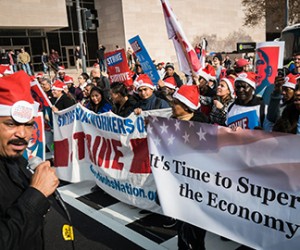
By Ned Resnikoff
Slowly but surely, Washington is beginning to take notice of America’s Gilded Age-level economic inequality.
Less than a year ago, President Obama headlined his 2013 State of the Union with a vow to “finish the job” on deficit reduction; his proposal for a modest increase in the minimum wage came later in the speech. Now he’s describing inequality as the “defining challenge of our time” and supporting legislation that would raise the federal minimum wage to $10.10, more than the $9 he originally suggested.
The basic dynamics of American inequality have changed little in the interlude between President Obama’s 2013 State of the Union and his speech this week on inequality. What’s different is the political context. When Obama made the former speech, low-wage strikes around the country were just beginning to ramp up. Ten months later, thousands of low-wage workers in more than 100 U.S. cities have walked off their jobs, taken to picket lines, and demanded a living wage.
“If we hadn’t had this year of these one-day strikes, we would not be having this conversation, I’m pretty convinced,” said Dorian Warren, an associate professor of political science at Columbia University. “In that sense, these strikes and protests are agenda-setting, and that’s the case with all social movements.”
Fast food strikes in particular have been gradually building in size and force over the past year. The day after the president spoke, workers at various fast food restaurants engaged in the biggest work stoppage the industry has seen, affecting cities across the nation. The previous record for the largest strike in fast food history had been set in late September, with actions at restaurants in nearly 60 cities.
Walmart workers kicked off the trend of low-wage strikes about a year earlier, when they picketed during the single biggest shopping day of 2012. Workers at other retailers have subsequently staged similar strikes. In Washington, D.C. low-wage employees at federally contracted companies have repeatedly walked off the job, demanding the president sign an executive order to raise their wages.
Rep. Keith Ellison, Democrat of Minnesota, has spoken out frequently about the need for such action. He was among 50 members of Congress to co-sign a letter to the president asking him to “issue an executive order to raise wage standards, safeguard the legal rights and safety and provide labor stability for the low-wage workers on whom these federal agencies rely to fulfill their mission.” He told msnbc he has also personally approached both Obama and Labor Secretary Thomas Perez about the issue.
“They’re considering it, but they really have not indicated whether they like the idea or not,” Ellison said. The proposed executive order would raise wages for about 2 million workers currently making less than $12 per hour, according to a report from the think tank Demos.
While the president has been silent when it comes to lifting wages for people employed through federal contracts, his administration has become more vocal in recent months about its desire to increase the minimum wage. A proposal under consideration in Congress would raise the minimum wage to $10.10. But Ellison signaled that progressive Democrats may soon up the ante.
“There’s increasing buzz that it might not be adequate,” he said. “When you think about it, we have not been keeping pace with inflation. We’re supportive of it, but we need to go beyond the least we can do.”
When asked if he would support a bill raising the federal minimum wage to $15, which is the hourly pay being demanded by striking fast-food workers, Ellison demurred. He revealed, however, that he was working on a proposal that would tie the minimum wage to CEO compensation.
“We’re talking about how to put that into legislation,” Ellison said.
Any minimum wage hike, particularly an ambitious one, would need to clear one major hurdle: the Republican Party, which still controls the House and makes aggressive use of the filibuster in the Senate. For that reason, Columbia’s Warren predicted that executive action would come before legislation.
“If [Obama] doesn’t want to come out looking like a total hypocrite, there will be some kind of public pronouncement saying he’s going to do it, or a legal argument saying why he can’t,” the professor said. If congressional Democrats attempt to pass a higher minimum wage, Warren predicted it would occur in the run-up to the 2014 election.
Low-wage strikes could very well continue for long after that, or they could transform into something else. Both Occupy Wall Street and the current strikes are part of a multi-year struggle against inequality, Rep. Ellison told msnbc. He compared that struggle to the Civil Rights movement of the 1960s.
“Whether it’s Occupy or these fast-food worker strikes, well, someone could say that happened and then nothing happened,” he said. “But was the sit-in movement a flash in the pan as opposed to the Freedom Riders? It was all part of a general plea driven by currents in our society.”
Original Article: https://www.msnbc.com/all/low-wage-strikes-are-working
